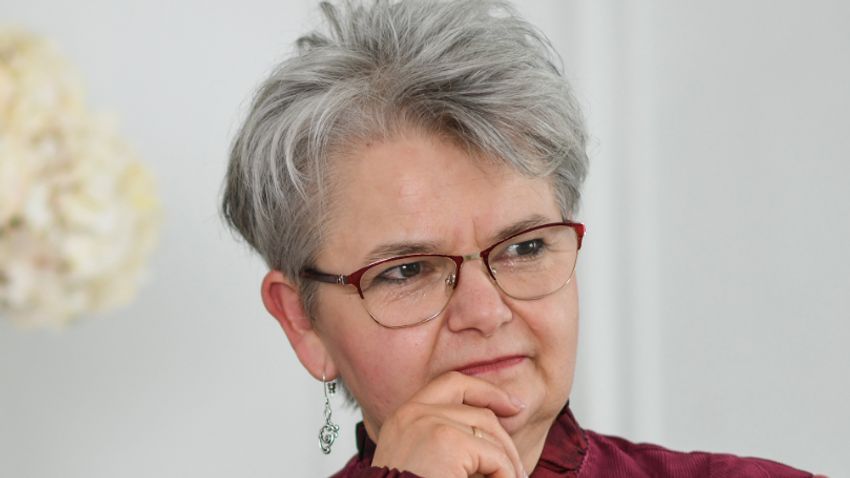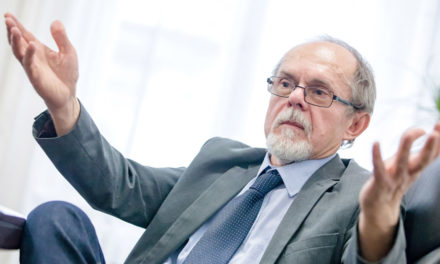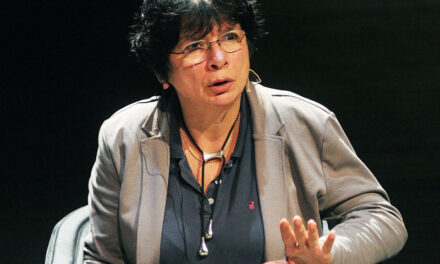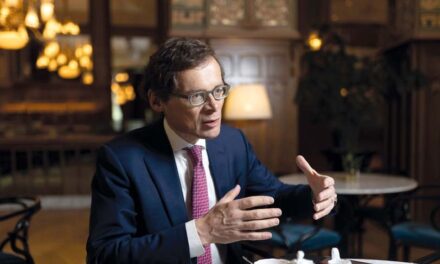Dr. Uzsalyn with educational researcher Rita Pécsi, a teacher at Apor Vilmos Katolikus Főyskola about the current challenges of the teaching career, the counter-selection of the teaching society, the lack of spiritual intelligence and how parents can set a good example in a world in which children are enslaved by the online space. Great interview.
Teachers' salaries are low, and there is hardly anyone in the country who would disagree with that. However, the demands of the protesters go far beyond the issue of wage settlement. What do you think about the state of Hungarian education?
Yes, the wage arrangement would really be essential so that the teacher, in addition to making a living, has the opportunity to come to his classes prepared and rested, not to have to take on a second or third job, or work in gardening or hairdressing when he finishes teaching. This is essential and a radical settlement would be necessary.
At the same time, there is unfortunately a huge counter-selection on the field, you could get into teaching courses with the lowest scores.
I have been working in teacher training for a long time, and I see that we can meet two types of teacher candidates: those who stayed because of their vocation, and those who just want to pass the time with their degree. The latter greatly discredited the track.
What are the challenges that teachers have to compete with?
There is a great diversity, it does not matter with what kind of preparation, what family background, what kind of neurological maturity the children arrive. So the work of a teacher has become incredibly complex. It is far from the fact that some kind of curriculum has to be handed over, of course it wasn't like that long ago, but today it has become much more complex. And let's say it: a salary increase is indeed essential, but it will not solve the education situation by itself. The situation of families is very challenging, there are many broken families, and the problem is often shifted to the teacher, who may be unprepared and may have come from the same confused situation. This is the biggest challenge, managing the changes that have taken place in families, and changing the way of thinking so that parents - and educators - are not afraid of children. Today there are no borders, no directions.
Many families do not have such a serious value system that it can be said that this is evidence. That's how it should be.
And it is also essential that the institution also has a definite "face", values, and everyday life adapted to it. Spoken and unspoken, but clear rules, the direction, amount, relationships of subject content, and so on.
When and why did teachers lose their social respect? Is this an inevitable part of the zeitgeist?
We often mention that only very exceptional personalities have captivating power - we can also call it authority - and their message for children. And no course material can replace that, I'm sure of that. Of course, the number of hours and the administration also burden the teachers. Unfortunately, from the children's point of view, the output does not necessarily measure what they need in life. What is school really for? Does it really prepare you for life? If not, he will remain a stranger for life. And then it is obvious that whoever works in this will have no honor, because what he is trying to convey is neither interesting nor relevant to the child. School becomes a stranger to life. This makes everyday tasks very difficult.
But it is also a big problem that emotional intelligence is not given enough emphasis, we focus on IQ performance, but what uses IQ is almost all emotional intelligence skills.
Creativity, humor, collaboration, cooperative skills, and so on. But the cultivation of emotional intelligence is only through experience, not through understanding. And what you mentioned: the zeitgeist also doesn't make the story any easier when it's all about the ego and the assertion of the individual at any cost.
Is it possible to return or gain the respect of the profession?
A very counter-selected community of teachers entered the institutions, this cannot be emphasized enough. But the prestige of the content of pedagogy has also weakened, today the child can pick up the applicable knowledge from other places, which the school does not necessarily give him. There is a great lack of spiritual intelligence, i.e. arousing and supporting a deepened interest in the big questions of life. It is not enough that we know something. Why is this important? What do we use it for? Where does all this lead? What is the cause and purpose of the matter?
On the other hand, the teacher's presence also fragmented. In the past, the teacher spent much more time with the children personally, almost the whole day, and there were no more than 2-3 teachers in the lower classes.
Today, we find that 8-10 people teach a small school, so the formation of the ability to bond is damaged, and the personal connection through which teaching can actually be effective cannot develop. This is a serious loss of prestige. It is true that there used to be classes of 40 people in classical or even monastic schools, but there they spent much more time together personally with the teacher; and not only for the duration of education.
But this can also be attributed to the zeitgeist, right? Everything is spinning up, everything is accelerating. The teacher is running, the student is running, the parent is running.
Of course, but this issue needs to be addressed by the management just as much as by the family.
Since the world is running fast, I still decide whether there will be a joint dinner. For example, when the child is small, I, as the head of the family, decide what kind of occupation to enroll him in. Zeitgeist here or there, if I don't have a set of values and I'm burdening the child, then we can't connect with each other, and family life also degenerates into administration.
And similarly, a responsible teacher should be vigilant to make sure that there is no multiplication table practice, or a lesson preparing for a competition or competency test instead of singing and playing, and whether we take time to talk about issues that stress the students.
In an interview you recently said that "unfortunately, we use our smart devices very stupidly". How can a parent set a good example in a world in which children are enslaved by the online space?
Awareness is also a matter of education. If we don't get examples in the family or at school, that's a problem. We simply haven't been scared enough, or we don't teach parents enough that it doesn't matter what the child - or they themselves - play with, because this tool is addictive if used incorrectly.
I don't know why we are so meek and permissive, why we pretend that oh well, this is the 21st century and you can't avoid it.
In the instructions for use of every device for something, we can read in what form it should not be given to children, how old it is, what dangers it hides, the list of possible side effects in the medicine box is twice as long, and we are shamefully silent on this issue, and even let unsuspecting users mistake it for development. . Every year, I give 400 lectures to help parents, educators, managers, among others, on this topic. And I can't believe that e.g. it would not be possible to completely avoid using computer games or even smart devices until the age of six. Of course, I'm not talking about not watching two fairy tales.
If children look at the screen for several hours - unfortunately, research and experience show this - it causes addiction, but whoever says this already finds himself facing a huge lobby.
It's a giant business that wants nothing more than for us to spend as much time as possible using its products - by the developers' own admission.
What can we do if the child "clicks"? How to find the golden mean, how not to be "bad cops"?
Of course, it's a struggle, as is when to go to bed, where to go, how much to study, and so on. No one claimed that raising children is easy, but the wider environment also plays a big role. If, for example, we could boldly say in schools to turn off the phone, and the principals would not be afraid that this violates the student's right to privacy, that would be an important step. Or is the development of the child's brain and thinking and protection from addiction not a personal right?
If we fear and protect them from addiction caused by alcohol and cigarettes, then why not from this?
Not to mention the shortages and their consequences. Because what distracts children from watching the screen for several hours? From movement, from human relationships, from nature.
Will the children living in the virtual, online world be able to live in an "offline" family as adults?
Confrontation is needed, and we have to help the parents if they still have small children. We have to decide how to represent our values and what direction to represent, it is our responsibility what will become of these children when they grow up. Because they might ask us, if we knew it was addictive, why did we allow it?
However, we know that we are facing a great danger, because the machine manipulates with dopamine.
Let's just walk down the street in a country where they have passed drug liberalization, that is, some drugs are legal, and see how twenty-year-olds sit on the curb and stare into nothing, because they have zero motivation after being saturated with the dopamine effect.
It is no coincidence that Silicon Valley workers send their children to "uninfected" schools, and we are not talking about Covid. And why? Because they know exactly how the machine works.
And if these people openly told us to be careful, then who is responsible? The leadership. The country's, the family's, the school's - we are all responsible for exposing our children to such danger, simply by citing the zeitgeist. And it is also very important to note that the child's cerebral braking system has not yet developed: he has the gas pedal, but the parent has the brake. We can't let him up the mountain with a high-horsepower bike, telling him to come down, when we know his bike has no brakes... But to answer the question: of course, you can come back, the ability is not taken away.
Who really holds the reins? We can often feel that in the West, instead of national governments, the financial oligarchy is in charge.
Huge deal, that's for sure. But if we go into it, we serve it, and even when the parents themselves wake up and go to bed with these devices, they pass this model on to their children, and after that we are no longer talking about educational issues, but about the treatment of addiction. However, managing the media is a learned behavior.
The child will be what we raised it to be - and this is not a threat, but good news!
We are known as the standard bearer of Organic Pedagogy, what does this mean? How can the legacy of Josef Kentenich be transferred to everyday life?
It takes into account the healthy functioning and natural growth of life. Humans are social beings, so Organic Pedagogy places great emphasis on the education of attachment, as well as on emotional intelligence, which also applies IQ. Emotional intelligence decides what we will use the set of knowledge we learned in school. Organic Pedagogy focuses on emotional intelligence, which is why it pays special attention to the arts, creativity, and closeness to nature.
Today, brain research also emphasizes that we have a great need for direct contact with the living world, that we can later transfer this knowledge to the family "living world", to other people, to living relationships.
Among other things, we can learn from nature that things grow slowly. With Organic Pedagogy, for example, we created school gardens in many schools of the Diocese of Vác so that all children can come into contact with the living world.
That sounds really good.
In the same way, in the school I lead, everyone took part in art classes, not only those whose parents specifically directed their children in this direction. If IQ is 90 percent emphasized in the curriculum, we need to find a way to balance that out somewhat. It requires responsible leadership, responsible pedagogy and responsible parents. And I can show you schools that operate with this approach, and accordingly, in the lower grades, for example, there are no ICT tools until the age of 12, but everyone is an art school. So I say we need to wake up.
If you don't manage to step on the brakes and reassess all of this in time, what skills will be lost? We know that deep reading is pretty much there, but what else will it take away?
The presence. The presence of the individual in the moment affects everything from decision-making. How do I perceive my environment, the other person, can I pay attention? So the attention is also lost. Today, numerous researches confirm that there is a serious connection between machine use, or more precisely, inappropriate machine use, and attention deficit disorder. Or, for example, children develop digital autism - just like autistic children, the ability to communicate is lost, but manual skills are also at risk.
Our basic need is to connect with another person, and if this is violated, the symptoms of deficiency appear: anxiety, feelings of inferiority, self-esteem disorders, depression. So relationship skills are related to almost everything, because we are social beings.
During the virtual connection, when we see each other through the camera, our body does not produce oxytocin, which is the so-called "connection" hormone. After the pandemic, we could also see that adults wanted to go back to work, and children to school, because there was a lack of personal connection. Csíkszentmihályi says that if there are more online relationships than real ones, oxytocin production will stop and people will not be interested in human relationships. And this is a very serious loss, let's think about it. Not only will we be bad at making connections, but we won't be interested in our mother, our child, our love, our friend, our grandparent.
At the end we find self-liquidation.
In addition, a frustrated self-liquidation. Because you can't go against nature that way. The situation is the same with the identity crisis: the skill of inner silence, the skill of self-knowledge is also lost. If someone builds his own personality virtually, he does not know his real personality, i.e. himself. So the virtual world produces a very complex injury surface, and we lose connection with life on many levels.
What do you think about the rise of artificial intelligence? In addition to its many undeniable advantages, what dangers does it have for children?
Before artificial intelligence enters a person's everyday life, a stable nervous system, value system, and relationships must develop. Such a personality can more calmly take control of the new artificial intelligence, which, by the way, we don't even know exactly what it does. I am really looking forward to the conference where artificial intelligence researchers were invited to present what AI can and cannot do. It will be important for professionals to think about what pedagogy will do with this? Because we can't see through it yet, that's for sure.
Telex recently devoted a long article to your discredit . What do you think you stepped on?
As I have already mentioned: if children watch the screen for several hours, it is addictive, but whoever says this already finds himself facing a huge lobby. so
I stepped on the chicken eye of a huge store. By the way, I received so many signals that I shouldn't even answer, because these journalists who describe themselves as fact-checkers clearly represent the business lobby in every field.
At the same time, an acquaintance of mine from a psychiatric clinic in a big city called me and told me that this preventive, awakening education is important, because the sad fact is that young addicts are waiting in line and can only make appointments for next January, the situation is so serious. The lobby therefore strives to shape awareness, but does not care about the consequences, only the momentary benefit. With that said, I never said that we shouldn't use the machine, but we did
let's pay attention, because it really doesn't matter at what age what we do and what price it costs.
Featured image: Nikolett Várady/Pálos Spiritual Center













